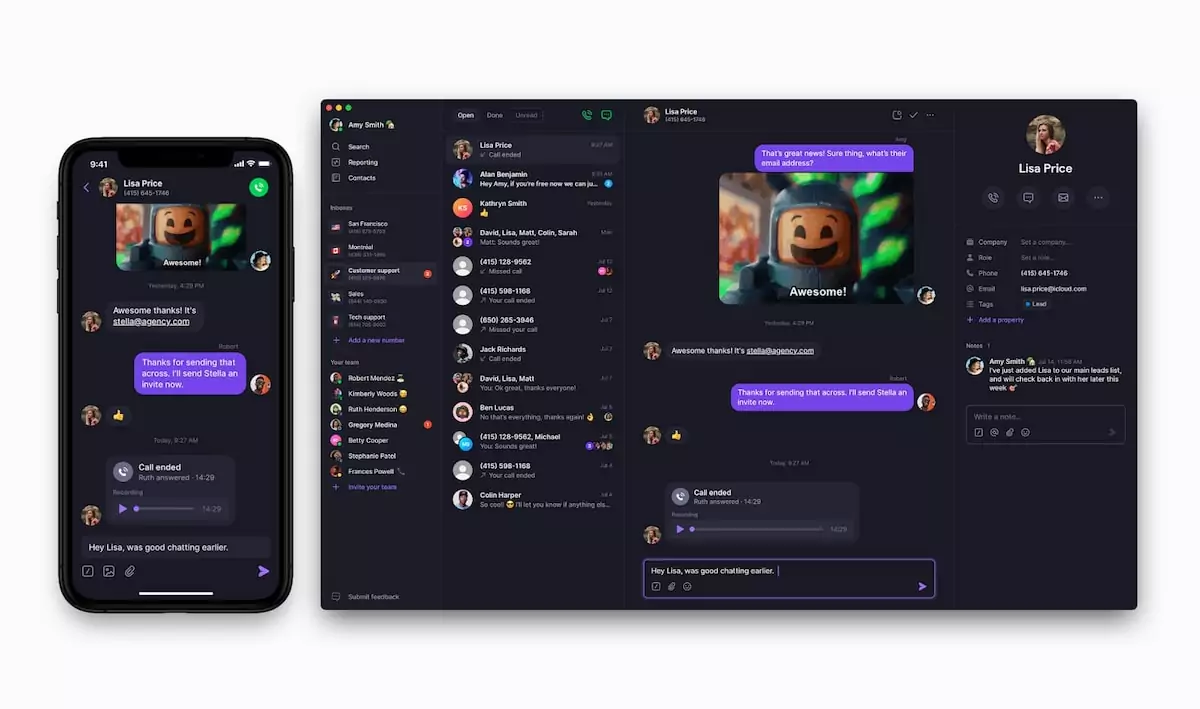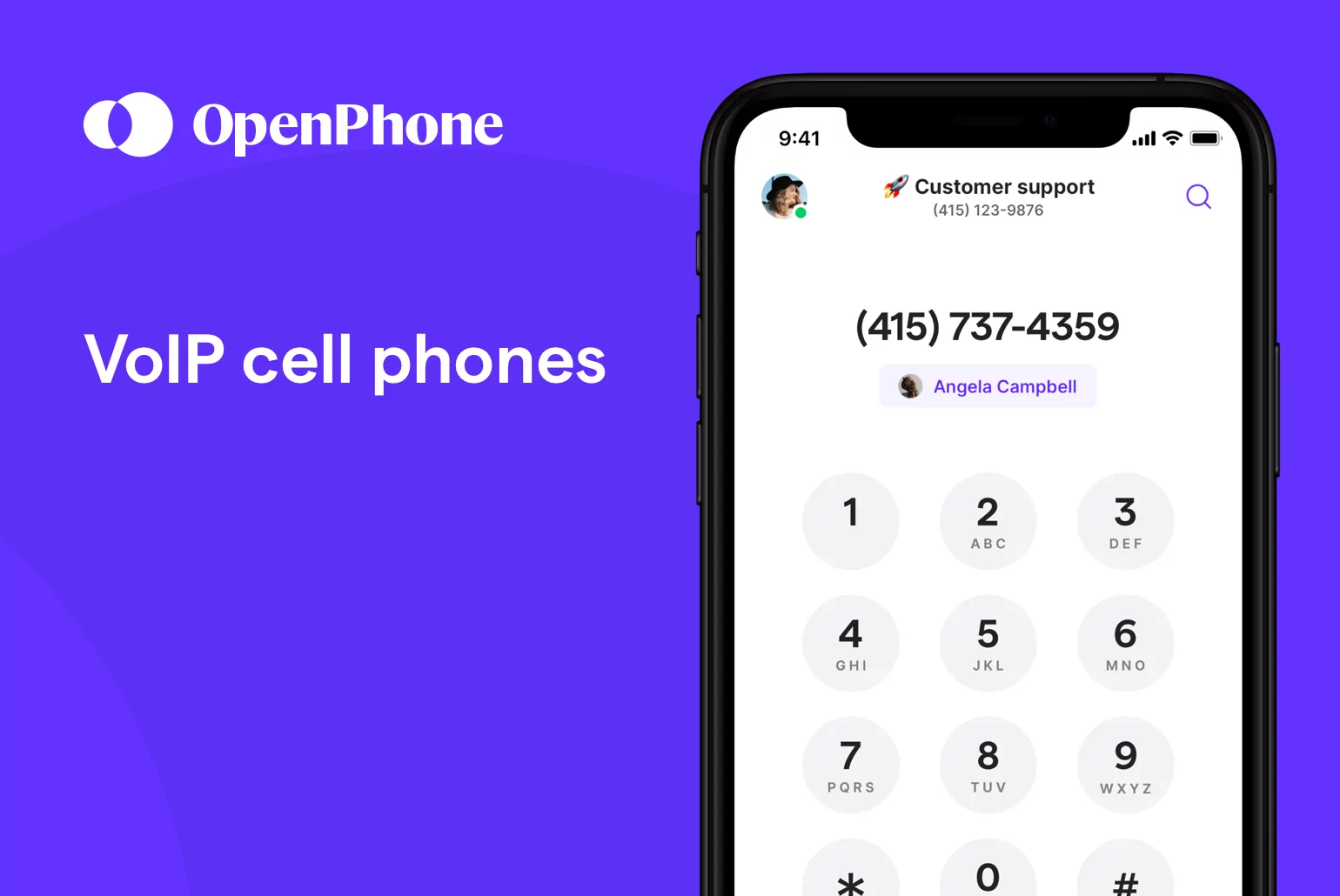So, you’ve heard of voice over internet protocol technology (VoIP) and are eager to begin implementing a VoIP phone system into your business processes. You understand the VoIP basics, but perhaps have some lingering questions about VoIP cell phones that need resolving before you go full steam ahead?
You’ve come to the right place. In this article, we’ll address Android and iPhone VoIP cell phone usage and its benefits. You’ll learn why more businesses than ever are making the transition to VoIP mobile phones. In the end, you’ll know all the tools necessary to become a successful VoIP-reliant business.
How does VoIP work on cell phones
You can complete VoIP calls or texts through a service provider’s VoIP app for your iPhone or Android device. When you place calls with your cell phone over VoIP, your voice data gets converted into digital signals. Then, using voice over IP technology, these signals are transmitted to the receiver via your cell phone’s internet connection or data plan using 3G, 4G, or LTE.
You can also set up a WiFi hotspot from your phone if needed. This flexibility means your call won’t drop or experience connection problems if you wander out of reach of a stable WiFi connection.
How to access mobile VoIP providers
There’s no shortage of VoIP providers on the market today. Some VoIP services are built into your smartphone, like FaceTime for iPhone users. Android-compatible alternatives like Google Duo or WhatsApp also exist. You may be familiar with or have used other popular VoIP apps like Skype.
Related: Best second phone number apps
However, basic smartphone VoIP platforms often lack the features, functionality, and flexibility you need for a business phone system. To use a more sophisticated VoIP service, like OpenPhone, you simply download a mobile application to your cell phone.
It only takes a few minutes to get started using OpenPhone. After which, you’ll have access to the expanded features and benefits of a VoIP business phone service.
Your new business “softphone,” as your VoIP cell phone is known, gives you two numbers on one phone. One number for all your personal conversations and a second, separate number for work. Compared to traditional phone systems, it’ll be cheaper, easier to scale, and conducive to remote work — perfect for today’s business environment.
4 benefits of using mobile VoIP providers
So, what exactly are the benefits of switching to VoIP? We could go on for hours about the benefits of virtual phone systems. For the sake of time, we’ll keep it simple in this section as we dive into the biggest benefits of using a mobile VoIP provider.
1. Keep your personal number private
Because you can hold multiple phone numbers in a single device, a VoIP cell phone makes it easy to keep your personal number private. You will never again have to give your cell phone number to clients or colleagues — and never worry again about receiving a business call outside of your working hours.
Not only does this help you maintain a healthy work-life balance, but it also helps you keep your head straight when it comes to business communications. Your smartphone app securely stores all work-related calls and messages as a second number on your device. That way, you know exactly where to access them.
2. Collaborate with your team
Most VoIP phone services give you the ability to check in on any conversation or voicemail that takes place over a shared business phone number. You will never get a busy signal, no matter how many of your colleagues are using the same number.
It’s also easy to assign new phone numbers to your teammates or add them to an existing number – all it takes is a few clicks on your smartphone or computer.
As if that convenience weren’t enough, services like OpenPhone go the extra mile. You can tag your teammates, react to messages, and internally comment on external conversations. These messaging and calling features help ensure your clients receive the stellar customer service they expect. You and your teammates will always be on the same page too.
3. Get the features your business needs
Built-in smartphone VoIP solutions like FaceTime are great for catching up with family and friends, but the fact of the matter is they just aren’t optimized for business communications. For your business phone system to work smoothly and efficiently, it needs to make your job easier.
OpenPhone’s business phone features, like phone call transferring, interactive voice response, and call recording, allow you to do just that. We even offer business integrations with HubSpot, Slack, and Zapier. With new features always on the way, you’ll enjoy access to a phone system that anticipates the needs of your growing business.
4. Don’t have to carry around two phones
Are you tired of hauling around two cellular devices? Whether you’re an entrepreneur trying to juggle personal and work calls or a growing small business looking for a more streamlined way to manage communications, VoIP services allow you the flexibility to house multiple phone numbers on one device.
You’ll be able to see on your screen if your incoming calls are personal or work-related. Then you can decide to respond. You can even set a different caller ID for each phone number or choose to respond with a different number than the one that’s ringing. Plus, you can call and text from your computer with the right VoIP provider.
Dan Hutchings, a Dog Training Elite franchise owner with multiple locations, uses OpenPhone so he can have clear oversight into his team’s conversations.
“I have trainers out in the field that I need to have access to the information, but I don’t want to be constantly inundated with text messages and phone calls,” says Dan. “The trainers like it because they can have their own cell phone and then turn off the app at night when they don’t need it.”
What do you need for VoIP to work on your cell phone
A VoIP cell phone service might seem too good to be true, and you might expect to need lots of equipment or software to get started. The beauty of internet-based phone systems is that they require none of that. You can begin calling from your cell phone once you have access to the following three things:
- Reliable internet
- An up-to-date operating system on your device
- A provider that allows you to default to data if you lose a WiFi connection
While some business VoIP users find they need to upgrade their broadband or alter their phone settings, most find they’re able to operate with their existing setup. OpenPhone uses relatively little data when you need to tap into your cellular network. This makes OpenPhone a far more cost-effective solution than traditional landline business phone systems.
Why businesses offer VoIP cell phone options
Even before the COVID-19 pandemic entered the scene, bring your own device (BYOD) policies were on the rise. Recent analyses predict that in the next five years (2021-2026), the BYOD market is expected to achieve a compound annual growth rate of 15%. The largest BYOD population is in North America, where using one’s personal phone at work has become a norm.
Since the start of the pandemic, the rise of remote work and an increased emphasis on low-cost business practices have caused BYOD numbers to skyrocket. BYOD allows employees to work on their own schedule and from locations other than the office, like home or a coffee shop.
For employers, they can more easily onboard teammates because they don’t have to purchase and configure new equipment for new hires. New employees can easily add a business line to a cell phone.
Say goodbye to desk phones and outdated telephony services, and hello to the modern world of VoIP cell phones.
Switch to a VoIP cell phone with OpenPhone

As you can see, the versatility offered by a VoIP service provider allows your business to work more efficiently and scale more easily. If you’re curious about trying out some of the best VoIP technology on the market, check out OpenPhone.
Whether you’re calling from your VoIP cell phone or another supported internet-enabled device, you can expect crystal clear call quality, a wide array of business features, and a sleek, modern calling app. To learn more about all that OpenPhone has to offer, sign up for your free OpenPhone trial today.
